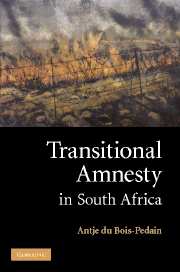Book contents
- Frontmatter
- Contents
- List of cited Amnesty Committee hearing transcripts
- Frequently cited Amnesty Committee decisions
- List of abbreviations
- List of abbreviated cases
- List of figures
- Preface
- Introduction
- 1 The TRC-based Amnesty Scheme: Background and Overview
- 2 The Practice of the Committee When Making Decisions
- 3 The Committee's Interpretation of the Political Offence Requirement
- 4 The Concept of Full Disclosure
- 5 Truth Recovery in the Amnesty Process
- 6 Victim Empowerment in the Amnesty Process
- 7 Perpetrator Accountability in the Amnesty Process
- 8 Conditional Amnesty and International Law
- 9 Conclusion
- Bibliography
- Index
8 - Conditional Amnesty and International Law
Published online by Cambridge University Press: 24 July 2009
- Frontmatter
- Contents
- List of cited Amnesty Committee hearing transcripts
- Frequently cited Amnesty Committee decisions
- List of abbreviations
- List of abbreviated cases
- List of figures
- Preface
- Introduction
- 1 The TRC-based Amnesty Scheme: Background and Overview
- 2 The Practice of the Committee When Making Decisions
- 3 The Committee's Interpretation of the Political Offence Requirement
- 4 The Concept of Full Disclosure
- 5 Truth Recovery in the Amnesty Process
- 6 Victim Empowerment in the Amnesty Process
- 7 Perpetrator Accountability in the Amnesty Process
- 8 Conditional Amnesty and International Law
- 9 Conclusion
- Bibliography
- Index
Summary
The question asked most frequently, by lawyers and non-lawyers alike, in respect of the South African amnesty scheme is whether it can be a model for other societies in transition. And indeed, for all its limitations and flaws, the preceding analyses have shown that the conditional amnesty which South Africa chose to implement is capable of securing a number of important objectives. It has the capacity to attract large numbers of perpetrators, whose submissions constitute, at a minimum, an acknowledgment of responsibility in the form of agency, and often add more (and more reliable) information to the historical record than could have been expected to result from criminal trials. It provides a modicum of satisfaction to victims by offering them participatory options that go beyond what could be made available to victims in a criminal trial. The opportunities for confrontation which it creates may also assist some individual victims in their personal quest for understanding and closure. Despite the fact that the outcome of the process ultimately shields perpetrators of often heinous crimes against legal liability and punishment, and in doing so also denies victims the satisfaction that usually accompanies a criminal conviction and sentence, the process achieves a significant degree of personal accountability. It can credibly be argued that, provided it is implemented appropriately, this kind of amnesty constitutes a successful way of dealing with the aftermath of civil conflict.
- Type
- Chapter
- Information
- Transitional Amnesty in South Africa , pp. 300 - 335Publisher: Cambridge University PressPrint publication year: 2007



